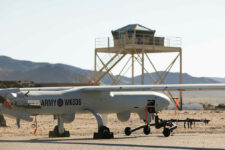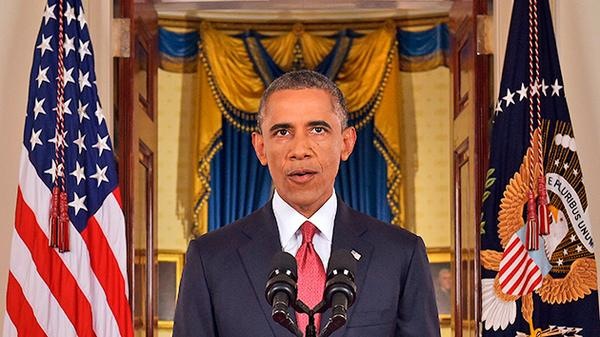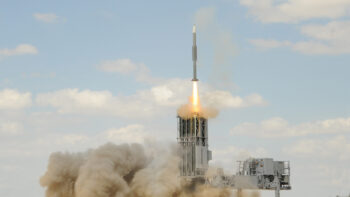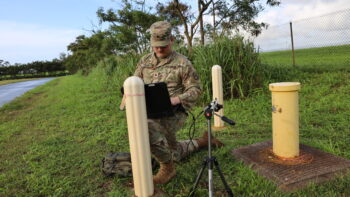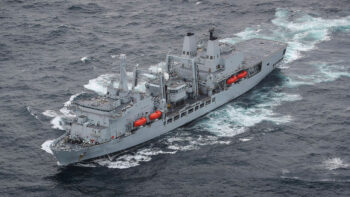Mitt Romney recently offered a PowerPoint presentation at his annual ideas festival in Park City, Utah to highlight President Barack Obama’s 20 worst foreign policy mistakes, grist for his argument that Obama is “the worst foreign policy president in history,” and Hillary Clinton a well-traveled but mistake-prone former “Secretary of Schlep.”
In this election season there is political advantage to be leveraged from a world beset by turmoil and conflict, and the perceived failure of the Obama administration’s second term foreign policy. To understand why the next commander-in-chief is bound to embrace a more muscular foreign policy – Republican or Democrat – it’s important to understand how the Obama Doctrine steered off course.
In just the past year the administration has been forced to rush U.S. troops back to Iraq and then reinforce them, and launch sustained airstrikes over both Iraq and Syria targeting the Islamic State. Planned U.S. troop withdrawals from Afghanistan this year have been frozen in the face of a resurgent Taliban, and military experts continue to criticize the administration’s deadline for withdrawing all U.S. troops by the end of next year. The Pentagon also just announced the redeployment of battle tanks and heavy armored equipment back to Europe to calm the nerves of NATO allies shaken by Russian aggression in Ukraine.
What’s most remarkable about those reversals is how rapidly an Obama Doctrine of international retrenchment and domestic renewal — coupled with political paralysis and a budget impasse in Washington that have severely degraded military readiness — left a perceived global power vacuum. It has rapidly been filled by bad actors behaving very badly, creating a narrative of U.S. retreat that is proving hard to dispel.
“The Obama administration doesn’t get all the blame for events like the Arab Spring that were largely beyond U.S. control, but there is a global perception that the United States is undergoing a period of retrenchment, and that the Obama administration is hesitant or unwilling to apply U.S. power across a spectrum of crises and regions,” former Defense Secretary William Cohen, head of the Cohen Group, said in an interview. European leaders interpreted the downsizing of the U.S. military presence on the continent, he said, as a decline in Washington’s level of commitment to NATO, and in terms of actual military presence the Asian “pivot” has been underwhelming.
“Russia and China now see an opportunity to aggressively press their claims in places like Ukraine and the South China Sea,” said Cohen. “We have less influence in the Middle East than at any time in many decades. And the level of discomfort with U.S. leadership, or lack thereof, among traditional allies like Israel, Turkey, Egypt and Saudi Arabia has never been higher. So the United States is sounding an uncertain trumpet internationally, and we’re badly in need of a debate about what our role in the world is going to be this century.”
The Rebalance
That debate will have to begin with the Obama Doctrine, which appeared to have much to recommend it. A relative strategic rebalance from Europe to Asia simply followed a shift in global wealth long underway. History is replete with conflict between major status quo and rising powers, so as the former the United States’ top foreign policy priority would be to peacefully manage the integration of an ascendant China into the international system. A Europe that is largely democratic and stable is certainly prosperous enough to police its own backyard. With the United States becoming increasingly energy independent, there is a persuasive argument that the country was over-invested in the Middle East, especially after the long, costly, and ultimately unsatisfactory experiment in democracy building in Iraq.
Republicans have focused especially fierce criticism on the administration’s attempt to “reset” relations with Russia, and to reach a deal with Iran that thwarts Tehran’s suspected nuclear weapons ambitions. Yet for a country over-extended by two long wars, those diplomatic gambits made strategic sense, and each has a historic antecedent in game-changing diplomacy by Ronald Reagan to reach arms control agreements with the former Soviet Union, and Richard Nixon’s outreach to China.
The “Russian reset” was reached with former Russian President Dmitry Medvedev, a leader the West almost unanimously concluded was a reformer and moderate. It led to a modest arms control agreement with New START, and garnered Russian support on the U.N. Security Council for crippling sanctions that finally bought Iran to the negotiating table over its nuclear program. If anything the current nadir in U.S.-Russian relations resulted from Washington’s decision to essentially subcontract Russian-Western relations to an unprepared European Union, which stumbled into a disastrous tug-of-war with Moscow over Ukraine’s economic orientation.
Those who criticize the Obama Administration for reaching out to Iran ignore the fact that George W. Bush tried the “cold shoulder” approach for nearly eight years, during which Tehran built thousands of uranium enrichment centrifuges and made dramatic progress towards a nuclear weapons capability. The deal now being negotiated will have to be weighed against the likely fracturing of the international consensus behind Iran sanctions, and reliance on the threat or use of military force to stop Iran from building a nuclear weapon.
“Overall I think the Obama Administration’s focus on Asia was exactly right, and they’ve been pretty effective in finding the right balance between working with China on macro-economic issues, while at the same time reassuring Asian allies of our support in their dispute with China about its clearly illegal activities in the South China Sea,” said Nicholas Burns, a professor at Harvard Kennedy School of Government and former number three at the State Department. “I also think they’ve done pretty well working with the Europeans to contain Putin and Russia with sanctions, and to reassure NATO’s Baltic members. The administration has been less certain in the Middle East, because they never figured out a strategy for dealing with Syria, which has made them look indecisive. Having said that, any U.S. administration would be hard pressed in trying to deal with today’s Middle East.”
The Arab Winter
Strategic narratives are powerful tools, however, especially when they are repeated in a White House echo chamber. At some point Obama’s increasingly insular White House team apparently started believing its own press releases that the death of Osama bin Laden in 2011 meant that the “war on terror” was over, and it was safe to bring U.S. troops home. The first indication was the premature withdrawal of all U.S. troops from Iraq at the end of 2011. By refusing to make a major effort to keep U.S. forces in Iraq, Obama essentially let the U.S. insurance policy lapse in Iraq, just as a major storm was poised to break over the region.
The United States’ authoritarian allies in the Middle East were aghast that Obama sided with the democratic revolutions of the Arab Spring, calling early for Egyptian dictator Hosni Mubarak to step aside. But that tension between America’s democratic values and its interests in stability even when imposed by friendly tyrants has long colored those relationships. George W. Bush had similarly sided with democrats during a mini-Arab Spring in 2005. Then as now, the United States was ultimately left holding its nose with one hand, and the bloody hand of an Egyptian dictator with the other. Libya’s slide into failed state status after a NATO air campaign led by France and Great Britain apparently convinced the White House that U.S. military action in response to Arab Spring disorder only made matters worse.
If there was one shoal that decisively cracked the spine of the Obama Doctrine, it was the Syrian civil war. First the White House ignored the early advice of its top national security officials who argued for covertly arming moderate Syrian rebels, lest a prolonged and increasingly sectarian civil war inflame the region’s Shiite versus Sunni divide and give rise to Islamic extremist groups. Then Obama very publicly drew a red line against Syrian dictator Bashar al-Assad use of chemical weapons and did not enforce it. When a resuscitated Al Qaeda in Iraq rose from the fire and rubble of Syria’s civil war as predicted, renaming itself the Islamic State of Iraq and Syria (ISIL), the administration did not react until the group’s lightening offensive last summer nearly overran Iraq.
Even today, with U.S. troops back in Iraq, launching airstrikes in Iraq and Syria and staying put in Afghanistan, the perception of Obama as a reluctant commander-in-chief and the United States as a feckless friend persists. “The entire nation-state security structure that we helped build in the Middle East over the past half century is coming apart at the seams, and the White House keeps sending up reactive flares of activity and worrying about message control, as if this was a political campaign,” said James Jeffrey, the former U.S. ambassador to Iraq and currently a fellow at the Washington Institute for Near East Policy. “There’s a strong perception that Obama is willing to order antiseptic drone strikes against terrorists, but he really isn’t prepared to wage a real war against ISIS. I don’t think his heart is in it.”
But Still Indispensable
As the country enters a presidential election season questions of how candidates would “fix” U.S. foreign policy, loom large. Hillary Clinton in particular will need to consider which parts of Obama’s foreign policy legacy to defend, and how her own more assertive foreign policy instincts will play to an anti-war liberal base. Republicans will have to sell it to a war-weary American public, and explain to a tax-averse Republican base how they would back a more vigorous effort with increases in defense spending.
Whoever succeeds Obama in the Oval Office, the next commander-in-chief will confront a new strategic reality that bedeviled the foreign policies of both George W. Bush and Barack Obama. We are still the “indispensable nation” but we live in a world beset by five-alarm fires, with great risks associated both with U.S. action and inaction.
“The Cold War and Post-Cold War eras have definitely passed, and we’re entering a new global era in which the old international system and norms of international behavior that we developed after World War II no longer work,” said Brent Scowcroft, former national security adviser to President George H.W. Bush. As a result of the information and communication revolutions, he noted, “more people know what’s happening around the world than at any time in history, and increasingly they are determined to do something about it. That has put the nation-state system under nearly constant assault, which is pulling the world in a new and unfamiliar direction.”
As the chief defender of an international system under siege, the United States can reassert its costly leadership or grudgingly accept a reordering of the world into a much more chaotic — and threatening — alignment of power centers. Hopes that the United States could safely shrug off the burdens of global leadership have largely died along with the Obama Doctrine.
Israel signs $583 million deal to sell Barak air defense to Slovakia
The agreement marks the latest air defense export by Israel to Europe, despite its ongoing war in Gaza.








